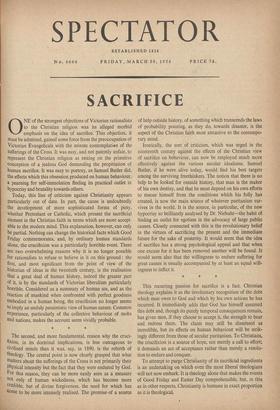SACRIFICE
0 NE of the strongest objections of Victorian rationalists to the Christian religion was its alleged morbid emphasis on the idea of sacrifice. This objection, it must be admitted, gained some force from the preoccupation of Victorian Evangelicals with the minute contemplation of the sufferings of the Cross. It was easy, and not patently unfair, to represent the Christian religion as resting on the primitive conception of a jealous God demanding the propitiation of human sacrifice. It was easy to portray, as Samuel Butler did, the effects which this obsession produced on human behaviour, a yearning for self-immolation finding its practical outlet in hypocrisy and brutality towards others.
Today, this line of criticism against Christianity appears Particularly out of date. In part, the cause is undoubtedly the development of more sophisticated forms of piety, Whether Protestant or Catholic, which present the sacrificial element in the Christian faith in terms which are more accept- able to the modern mind. This explanation, however, can only be partial. Nothing can change the historical facts which Good Friday commemorates, and, by ordinary human standards alone, the crucifixion was a particularly horrible event. There are two overwhelming reasons why it is no longer possible for rationalists to refuse to believe in it on this ground : the first, and most significant from the point of view of the historian of ideas in the twentieth century, is the realisation that a great deal of human history, indeed the greater part of it, is by the standards of Victorian liberalism particularly horrible. Considered as a summary of human sin, and as the reaction of mankind when confronted with perfect goodness embodied in a human being, the crucifixion no longer seems to imply an unduly pessimistic view of human nature. Common experience, particularly of the collective behaviour of mobs and nations, makes the account seem vividly probable.
* * * The second, and more fundamental, reason why the cruci- fixion, in its doctrinal implications, is less outrageous to civilised minds than it was, say, in 1890, is the rebirth of theology. The central point is now clearly grasped that what matters about the sufferings of the Cross is not primarily their Physical intensity but the fact that they were endured by God. For this reason, they can be more easily seen as a measure ,, not only of human wickedness, which has become more credible, but of divine forgiveness, the need for which has Come to be more intensely realised. The promise, of a source of help outside history, of something which transcends the laws of probability pointing, as they do, towards disaster, is the aspect of the Christian faith most attractive to the contempo- rary mind.
Ironically, the sort of criticism, which was urged in the nineteenth century against the effects of the Christian view of sacrifice on behaviour, can now be employed much more effectively against the various secular idealisms. Samuel Butler, if he were alive today, would find his best targets among the surviving freethinkers. The notion that there is no help to be looked for outside history, that man is the maker of his own destiny, and that he must depend on his own efforts to rescue himself from the conditions which his folly has created, is now the main source of whatever puritanism sur- vives in the world. It is the source, in particular, of the new hypocrisy so brilliantly analysed by Dr. Niebuhr—the habit of finding an outlet for egotism in the advocacy of large public causes. Closely connected with this is the revolutionary belief in the virtues of sacrificing the present and the immediate future for the sake of posterity. It would seem that the idea of sacrifice has a strong psychological appeal and that when one excuse for it has been removed another will be found. It would seem also that the willingness to endure suffering for great causes is usually accompanied by at least an equal will- ingness to inflict it.
This recurring passion for • sacrifice is a fact. Christian theology explains it as the involuntary recognition of the debt which man owes to God and which by his own actions he has incurred. It immediately adds that God has himself assumed this debt and, though its purely temporal consequences remain, has given men, if they choose to accept it, the strength to bear and redress them. The claim may still be dismissed as incredible, but its effects on human behaviour will be strik- ingly different from those of secular puritanism. To Christians, the crucifixion is a source of hope, not merely a call to effort; it demands an act of acceptance rather than merely a resolu- tion to endure and conquer.
To attempt to purge Christianity of its sacrificial ingredients is an undertaking on which even the most liberal theologians will not now embark. It is theology alone that makes the events of Good Friday and Easter Day comprehensible, but, in this as in other respects. Christianity is humane in exact proportion as it is theological.


































 Previous page
Previous page